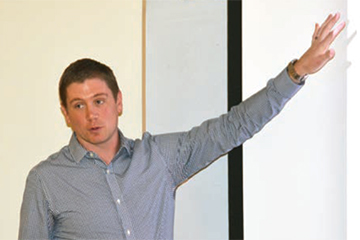A desire to make a difference led Skylar Rolf to the Institute for International Medicine, a nonprofit in Kansas City, where he was the chief operations officer for nearly six years. Now in the CBA management Ph.D. program, the Missouri native wants to make a difference through research and teaching.
He and Dr. Dennis Duchon, chair and E. J. Faulkner Professor of Management, co-authored the paper, “Donor Decision Making: Do Donors Care How Much a Public Charity’s Chief Executive Officer Gets Paid?”, which Rolf presented at the Academy of Management Annual Meeting in Vancouver, Canada, in August. The paper examines how CEO compensation might affect charitable giving for 185 Nebraska nonprofit organizations.
“Charity watchdogs are constantly looking at the CEO compensation and overhead expenses regarding the overall management of nonprofit organizations,” Rolf said. “This paper focuses on nonprofits in Nebraska and examines whether there is a threshold donors use to distinguish between excessive and reasonable CEO compensation.”
 Rolf teaching at CBA
Rolf teaching at CBA
The results of the study showed there is no relationship between CEO compensation and charitable giving in general. However, when a CEO’s compensation is $161,680 or more, it appears charitable giving declines. This finding lends further support that agency theory is relevant to the donor and board of directors’ relationship for CEOs. By decreasing charitable contributions when CEOs are paid $161,680 or more, donors are exercising their role as principal over the board of directors.
“From my own experience working for a nonprofit, this research is important in terms of corporate responsibility for the Board of Directors and how it influences the views of the organization overall,” he said. Rolf would like to expand his research and look at CEO compensation from the employee perspective.
“There could be more tension and lack of buy-in from the mission of the nonprofit if the CEO is highly compensated. With the number of nonprofits alone, this research is socially important,” Rolf said.
Published: January 7, 2016